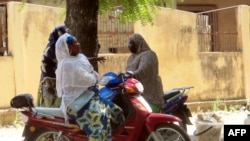Activists are working to end gender-based violence as part of the global campaign 16 Days of Activism that ends December 10. In Cameroon, rights groups are using the time to advocate against traditional practices they say are harmful to women.
In Ngomedzap village just south of Yaounde, village notable Essomba Eloundo said that as part of a cleansing ritual for a woman who has lost her husband, he feeds her millipedes and asks her to walk on her knees. He beats her with banana leaves and washes her with muddy water early in the morning.
The 60-year-old man said this is a tradition they inherited from their forefathers and they will continue it.
The point of the ritual is to prove that a woman did not kill her husband or conspire in his death.
Twenty-four-year-old Anastasie Bidja said she and three other women went through the ritual when they lost their husbands in a car accident four years ago.
She said their heads were forcefully shaved after they had been locked up in a small room for one week during which they were fed through a little window. She said they were not allowed to bathe and they were asked to carry out so many rites to prove they did not kill their husbands. When it was over, she said, she was forced to marry her husband’s younger brother.
Cameroon has close to 300 ethnic groups and an abundance of traditional practices.
Catholic sister Appolonia Budzee in northwestern Cameroon said many practices are harsh to women and she tries to educate communities.
"During funerals when the Fon dies, that is the head of a clan dies, the women mourn sitting on the floor and wearing no clothes meanwhile all the other people can wear their shoes, they can dress up normally and go about. And the worst that is very recurrent now is widows who have no rights of inheritance. The family of the husband sends you away with the children. You can not touch anything, you can not inherit anything," said Budzee.
Women’s groups in Yaounde kicked off the 16 Days of Activism Against Gender-Based Violence with a march protesting these and other traditions. Among them was Odile Manga of the NGO, Women's League.
She said they are saying enough is enough and practices such as female genital mutilation must end, the beating of wives like hardened criminals must end. She said many parents prefer to send their male children to school and keep girls at home and that it is only natural that she and others should come out and say no - that women have the same rights as men.
Cameroon is signatory to international conventions outlawing violence and discrimination against women and girls, yet practices like female genital mutilation remain common in some parts of the country.
This is the fourth year women’s rights advocates in Cameroon are marking the 16 Days of Activism. They say change is slow due to a lack of political will and a need for education.




